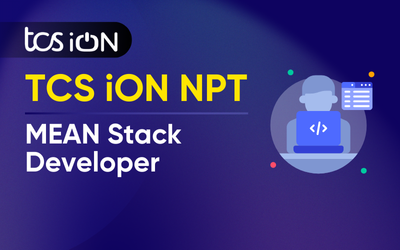TCS NPT Mean Stack Developer Exam Details
The TCS NPT Mean Stack Developer course is designed for individuals seeking to build expertise in the MEAN (MongoDB, Express.js, Angular, and Node.js) stack. It offers a blend of theoretical knowledge and hands-on practical application, covering essential aspects of front-end, back-end, database management, and API integration. This course ensures learners are equipped to develop high-performance web applications and deploy them in real-world scenarios. The exam evaluates candidates across two sections: a knowledge test and an application test, ensuring a comprehensive assessment of their capabilities.
What You Will Learn With TCS NPT Mean Stack Developer Course?
The TCS NPT Mean Stack Developer course offers in-depth training in MEAN stack development, helping participants understand core concepts and build practical skills. Key areas include front-end development with Angular, back-end development with Node.js and Express, database management with MongoDB, and end-to-end web application integration. By the end of the course, learners will have the skills needed to design, develop, and deploy scalable web applications.
TCS NPT Mean Stack Developer - Overview
Mean Stack Development involves a combination of technologies that work together to build dynamic web applications. The TCS NPT Mean Stack Developer course provides detailed insights into:
-
Front-End Development with Angular
- Importance: Front-end is the user's first interaction with an application.
- Learning Focus: Building interactive user interfaces using Angular.
- Skills Covered: Single Page Applications, Angular forms, event handling, and dependency injection.
-
Back-End Development with Node.js and Express
- Importance: Back-end scripting is essential for server-side logic and APIs.
- Learning Focus: Creating HTTP servers and building RESTful APIs with Express.
- Skills Covered: Node.js modules, asynchronous programming, and server-side routing.
-
Database Management with MongoDB
- Importance: Databases store and manage application data.
- Learning Focus: Managing data using MongoDB and Mongoose.
- Skills Covered: CRUD operations, data modeling, and replication/sharding.
-
Integration and Deployment
- Importance: Integrating all layers ensures seamless application functionality.
- Learning Focus: End-to-end integration of MEAN stack components.
- Skills Covered: Authentication, authorization, and production deployment.
TCS NPT Mean Stack Developer Exam Structure
The TCS NPT Mean Stack Developer Exam is divided into two parts:
Part A: Test of Knowledge
| Total Questions |
Marks per Question |
Total Marks |
Duration (Minutes) |
| 50 |
1 |
50 |
60 |
Syllabus for TCS NPT MEAN Stack Developer Exam
Syllabus for Part A: Test of Knowledge
| Sr. No. |
Module |
Descriptor |
Topics Covered |
| 1 |
HTML and CSS Basics |
Basics of web development with HTML and CSS. |
HTML tags, attributes, forms, CSS styles, selectors, and responsive design concepts. |
| 2 |
JavaScript Basics |
Programming fundamentals with JavaScript. |
Variables, loops, conditional statements, functions, events, and DOM manipulation. |
| 3 |
Node.js |
Backend development with Node.js. |
Setting up Node.js, asynchronous programming, Express.js basics, and REST API creation. |
| 4 |
MongoDB |
NoSQL database management using MongoDB. |
CRUD operations, schema design, indexing, and aggregation. |
| 5 |
Angular Basics |
Frontend development with Angular. |
Components, directives, services, routing, and dependency injection. |
Part B: Test of Application
| Total Questions (Case Studies) |
Total Marks |
Duration (Minutes) |
| 2 |
50 |
60 |
| Case No. |
No. of Questions |
Total Marks |
Module Coverage |
Weightage |
| 1 |
1 |
20 |
Front-End Development |
40% |
| 2 |
1 |
30 |
Node.js, Express, and MongoDB |
60% |
Syllabus for Part B: Test of Application
| Sr. No. |
Module |
Coverage |
Skills Assessed |
| 1 |
Full-Stack Integration |
Building a complete web application using MEAN Stack technologies. |
Creating RESTful APIs, integrating Angular with Node.js and MongoDB, and deploying applications. |
| 2 |
JavaScript and Node.js |
Application of JavaScript and Node.js for backend logic and APIs. |
Logic building, API design, and handling asynchronous operations. |
| 3 |
Angular Applications |
Developing single-page applications using Angular. |
Component design, state management, and routing in real-world scenarios. |
 3 months
3 months 11 modules
11 modules 3 months
3 months 12 modules
12 modules 3 months
3 months 15 modules
15 modules 3 months
3 months 9 modules
9 modules 3 months
3 months 6 modules
6 modules 3 months
3 months 7 modules
7 modules 3 months
3 months 11 modules
11 modules 3 months
3 months 10 modules
10 modules 3 months
3 months 13 modules
13 modules 6 months
6 months 12 modules
12 modules 3 months
3 months 8 modules
8 modules 3 months
3 months 10 modules
10 modules 3 months
3 months 17 modules
17 modules 3 months
3 months 16 modules
16 modules 3 months
3 months 8 modules
8 modules 3 months
3 months 7 modules
7 modules











